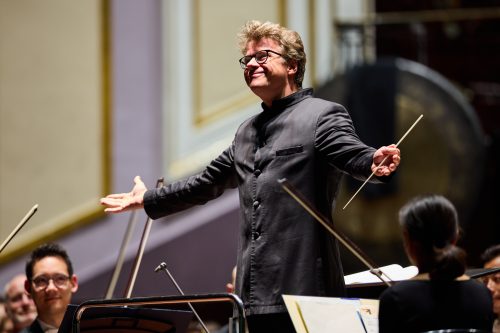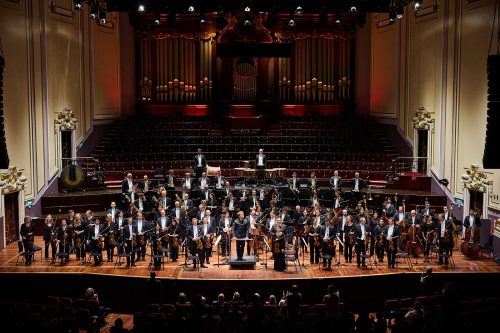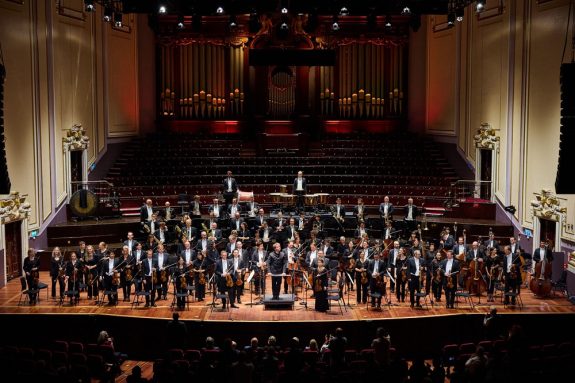
 United Kingdom Edinburgh International Festival 2024 [6] – Dvořák, Suk: Kateřina Knĕžíkova (soprano), Adam Plachetka (bass-baritone), Edinburgh Festival Chorus (director: James Grossmith), Bamberger Symphoniker /Jakub Hrůša (conductor). Usher Hall, Edinburgh, 9.8.2024. (GT)
United Kingdom Edinburgh International Festival 2024 [6] – Dvořák, Suk: Kateřina Knĕžíkova (soprano), Adam Plachetka (bass-baritone), Edinburgh Festival Chorus (director: James Grossmith), Bamberger Symphoniker /Jakub Hrůša (conductor). Usher Hall, Edinburgh, 9.8.2024. (GT)

Dvořák – Te Deum, Op.103 B 176
Josef Suk – Symphony No.2 in C minor, Op.27 ‘Asrael’ (1905/6)
This was one of the most memorable concerts that I have attended at the Edinburgh International Festival for many years, not only because of the virtuosity and gorgeous artistry of the musicians of this outstanding orchestra and their conductor but for the marvellous ‘Asrael’ Symphony by Josef Suk.
It is hardly surprising that the three-concert residency by the Bamberger Symphoniker was dominated by music from the Czech Republic; before World War Two, the orchestra were known as the German Philharmonic Orchestra in Prague, and in order to escape the Red Army, the ensemble relocated to the regional town of Bamberg in Bavaria from which they have become a renowned international orchestra. Many of the twentieth century’s finest conductors have worked with the orchestra, and for this residency, their chief conductor since 2016, Jakub Hrůša brought two of the least known pieces of Bohemian and Moravian music. There is a link in the two works because Suk was married to Dvořák’s daughter Otilie (who died at the early age of 27), and who was also a composer and a pianist. Her passing followed upon the death of Dvořák, hence the symphony is haunted by the theme of fate.
Dvořák’s Te Deum was commissioned before the composer’s domicile in America by Jeanette Thurber of the New York Conservatoire to commemorate the 400th anniversary of Columbus’s landing. The orchestra’s opening passages yielded a favourable impression of the musicality of the orchestra; the strings are golden-toned with magnificent brass and a virtuoso woodwind. Hrůša placed his violins on either side, with the violas to his left and cellos to the right. The trombones and horns were on either side of the woodwind group.
The entry of the timpani came almost like a shock at the start, somewhat startling for a sacred piece in the opening Allegro moderato, the singing by the chorus was spectacular, yet they seemed a little drowned out by the proximity of the percussion. The secular nature of the work was evident also in the Lento maestoso. At the same time, the ostinato hints at Indian folklore in the Vivace and in the celebratory ending movement Lento, again showing the work is more secular than religious; the composer had heard the Iroquois singers in Prague in 1879.
The Edinburgh Festival Chorus were magnificent in their peerless singing, and the soprano of Kateřina Knĕžíkova was a highlight of the evening with her beautiful dulcet tones; her interpretation was so clear we did not need to read the surtitles; one would like to hear more from her. The subtly-voiced bass-baritone of Adam Plachetka was stirring, assisted by the magnificent accompaniment from Hrůša’s orchestra.

The full glory and virtuosity of the orchestra were heard to the full in the second half with the hour-long ‘Asrael’ Symphony by Suk. This composer’s orchestral pieces in the concert hall such as Pohádka (Spring) are impressive for their colourful orchestration and charming harmonies, yet little else is heard by audiences here. The symphony was championed by Václav Talich, yet the complexity of the orchestration, and its length hinder it from being widely performed. Czech orchestras usually bring us the symphonies of Dvořák and Smetana, yet after hearing this, it is clear the ‘Asrael’ Symphony is a masterpiece that deserves more attention.
The ‘Asrael’ Symphony is heard more frequently in the recording studio, for there are several fine recordings available; I admire Talich’s ‘historic’ reading, and there is a fine interpretation by Yevgeny Svetlanov if you can find it. Jakub Hrůša’s belief in the score is revealed in that he has recorded it twice in recent years, and noticeably did not use a score. The symphony embraces the theme of the Angel of Death from Hebrew, and in which are heard quotations from the Requiem and Rusalka, and from his beloved Otilie.
The opening movement, Andante sostenuto, was graced by a beautiful cor anglais solo by Zsófia Magyar, and the orchestra exhibited all its brilliance by the outstanding swirlingly verdant strings; there were delightful solos from the flute of Daniela Koch, and especially at the close of the extended opening movement by the solo piccolo of Timea Acsai, and there is an overwhelming great theme of reflective passion throughout. In the Andante, there were some gorgeous harmonies that reminded one fleetingly of the luxurious orchestration of Korngold and Schoenberg, yet Suk’s individuality emerged triumphantly.
This was even more evident in the following Vivace, through the energetic playing creating of the rich strings and the effervescence of the wind – the spectacular vision of a night sky crossed by meteors and glowing comets as if we were hurtling through the cosmos. It was a shattering performance in which every musician brought out all the vivacious joy of Suk’s score, so great was the impression that a storm of applause broke out before the second part. The two last movements were written after the passing of Dvořák and Suk’s wife and assume a deeply tragic character, yet rather than undue emotion, reverence and human dignity prevail.
There are hints of (Richard) Straussian orchestration and of Dvořák, and Suk quotes an intriguing theme in a beautiful violin solo by the orchestra leader Bart Vandenbogaerde. The two harps invoke harmonies that are taken up by the lush strings like a great grieving heartbeat in the movingly poignant Adagio in memory of his beloved Otilie. In the Adagio maestoso, the intensity was enhanced by the thrilling timpani strokes invoking the approach of death and heightened by the tragic beat from the bass drum. Quotations from Dvořák’s Requiem and Rusalka emerge in homage to his mentor, and slowly after reaching a beautifully orchestrated culmination, the music slowly descends into silence.
There sometimes comes a concert which one finds difficult to forget for its exceptional musicality and performance, and this evening was one of those truly memorable events. I recall, in past festivals here, equally momentous performances of Delius’s A Mass of Life and Scriabin’s Prometheus which astonished one for their remarkable originality and performance. This closing concert of the Bamberger Symphoniker’s residency will remain with me for many years, and hopefully Josef Suk’s ‘Asrael’ Symphony will gather greater popularity in this country. This was a remarkable performance in which every measure of this virtuoso orchestra was heard; one hopes this will lead to more visits by this orchestra, and hopefully, they will bring more overlooked music to our audiences.
Gregor Tassie
